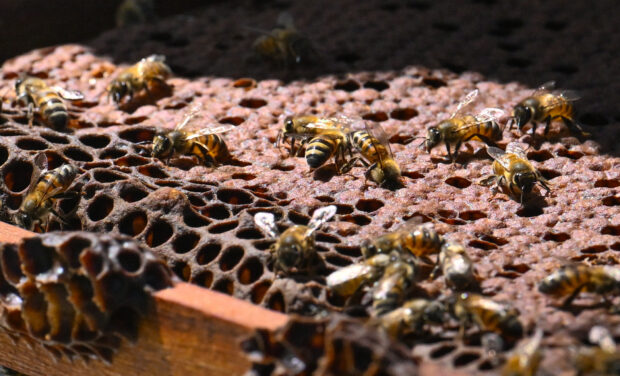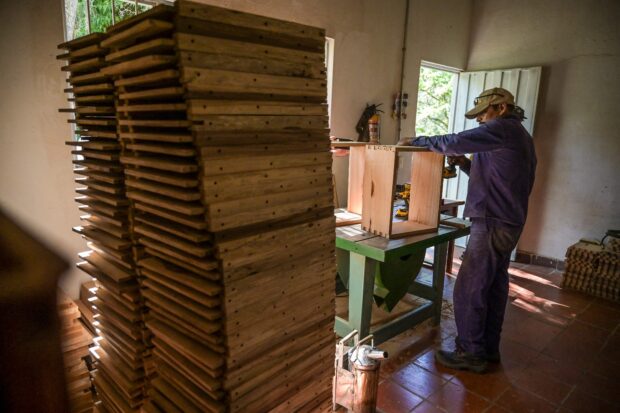Seized illegal timber repurposed to help bees in Colombia

Bees work on honeycombs inside a beehive in the municipality of Socorro in Santader departament, Colombia, on Dec. 3, 2023. Four warehouses full of illegal timber in northeastern Colombia are set to receive a second lease of life as they are transformed into apiaries, contributing to the conservation of bees which are threatened by climate change and agrochemicals. (Photo by JUAN BARRETO / Agene France-Presse)
SOCORRO, Colombia — In northeast Colombia, police guard warehouses stacked high with confiscated timber with a noble new destiny: transformation into homes for bees beleaguered by pesticides and climate change.
The illegally harvested wood is used in the Santander department’s “Timber Returns Home” initiative, building hives since 2021 to house the little pollinators so critical to human survival.
So far, the project has seen about 200 cubic meters (7,060 cubic feet) of wood transformed into 1,000 beehives, with another 10,000 planned for the next phase, according to the Santander environmental authority.
READ: Threatened bees find shelter in campuses
READ: What a buzz: saving Malaysia’s bees, one nest at a time
Article continues after this advertisementStaving off extinction
Previously, confiscated timber was turned into sawdust, donated to municipalities for projects … and sometimes just left to rot.
Article continues after this advertisementNow it is being repurposed to help address the “extremely serious problem” of possible bee extinction, said biologist German Perilla, director of the Honey Bee Impact Foundation.
About three-quarters of crops producing fruits or seeds for human consumption depend on pollination, but the United Nations has warned that 40 percent of invertebrate pollinators—particularly bees and butterflies—risk global extinction.

A worker builds hives with illegal timber in the municipality of Socorro, department of Santader, Colombia, on Dec. 3, 2023. (Photo by JUAN BARRETO / Agence France-Presse)
“The main threat is that we will run out of trees and there will be no flowers, because without flowers there are no bees, without bees there are no humans, and we will run out of food,” said beekeeper Maria Acevedo, one of the beneficiaries of the project.
In 2023 alone, she told Agence France-Presse (AFP), she lost more than half of her hives. She blames pesticides used in the nearby production of crops such as coffee.
According to official data, some 3,000 hives, each able to house around 50,000 bees, die off in Colombia each year. Laboratory tests found traces of the insecticide fipronil in most of the dead insects.
Multiple threats
Colombia has issued a ban on fipronil — already banned in Europe and restricted in the United States and China — starting February 2024.
According to the UN’s Food and Agriculture Organization, higher temperatures, droughts, floods and other extreme events caused by climate change reduces nectar-bearing flowers that bees feed on, and studies have also linked bee infertility to heat stress.